Why Do We Need Carbohydrates, Proteins & Fats in Our Daily Diet?
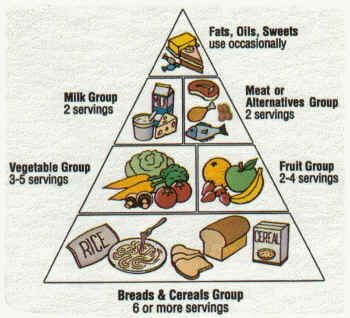
Eat Healthy ~ Grill, Instead of Frying
What exactly is a 'healthy balanced diet'?
We always hear about ‘a healthy balanced diet’…but what exactly does that mean?
Terms like ‘carbohydrates’, ‘proteins’ and ‘fats’ are used by our Doctors, Pharmacists and other health professionals when they are telling us what types of food are best for us but what roles do these nutrients play in our bodies?..And why do we need to have them in our daily diet?
By definition, a balanced diet is one which enables sufficient quantities of vital nutrients to be supplied to the body. It should not provide excessive amounts of carbohydrates, proteins, fats or minerals and vitamins to our body, neither should it provide too little of these nutrients. These nutrients are essential to the running of our systems. Looking closer, we realize that our body is composed of approximately two thirds (63%) water, 15% protein, 13% fat and 2% minerals and vitamins.
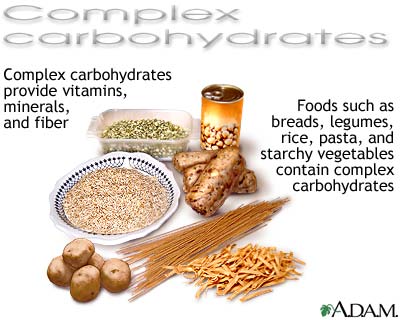
Carbohydrates
Carbohydrates are molecules that are broken down (metabolized) in the body to produce energy, so we can carry out physical tasks. For example they are converted to glycogen in order to be used by the muscles for any type of muscular work. Excess carbohydrates that the body doesn't require for energy are converted to fats and stored in adipose tissue cells (cells in the body that store fat molecules).
In most western countries where ‘junk food’ is relatively cheap to buy, carbohydrates account for around half of the total energy intake. In many cases, the majority of the carbohydrates taken in are in the form of sucrose. Sucrose is a type of sugar found in biscuits and cakes, and other sugary junk foods, and is referred to as an ‘extrinsic sugars’. Too much of these types of sugars leads to an imbalance in the blood sugar levels, fluctuations in the insulin levels and a raise in cholesterol levels.
In comparison, foods such as lentils & beans, seeds and vegetables that contain ‘complex carbohydrates’ are much more beneficial for the body as they break down much more slowly, keep insulin levels steady, provide energy for longer periods of time and as a bonus, lower amounts of carbohydrates are converted into fat and stored.
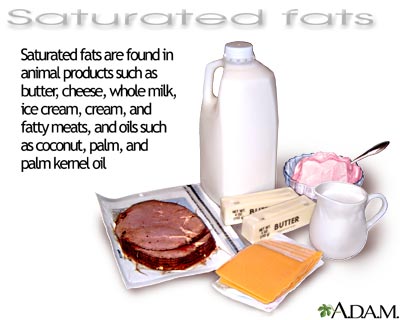
Fats
Fats provide energy for your body to be able to maintain its internal temperature. Furthermore, cells in the body contain membranes which are composed of fats, hence fats are important for cell development, particularly in the brain and the nervous system.
As fats are implicated in the development of cells, they are also important for tissue activity. Remember, tissues are a group of cells, so in order to maintain the integrity of tissues within the body, fats must be present within the diet. Specialised tissue cells surround the heart to protect it from damage, hence vital organs require fat too.
Foods such as dairy products (eggs, cheese, milk), meat and fast foods tend to contain saturated fats which are mainly used by the body to insulate and protect it, and are generally not considered essential for the body, hence eating too much of these types of fat can prove detrimental eventually.
Essential fats that the body needs are fats such as linoleic and linolenic acids; these are found in nuts and seeds and are required for many systems found within the body. For example, the cardiovascular, nervous & immune systems as well as the skin and the brain need these types of polyunsaturated fats (that are found in sesame seeds, sunflower seeds and flax seeds) in order for the body to work in its most efficient manner.
Moringa is a completely natural, highly effective weight loss supplement you can try to reduce weight:
Although some fatty acids are essential and beneficial for the body, there are some that can cause hyperactivity type reactions (allergies, asthma, eczema, dermatitis). An example of this type of fatty acid is Arachidonic Acid. The highest quantities of arachidonic acid are found in milk and meat out of all other types of commonly consumed foods. Arachidonic acid is involved in the inflammatory reactions in the body; it in fact encourages inflammation, hence leading to skin aggravation and allergy exacerbation when consumed in large quantities.
On the other hand, further investigation into other types of linolenic acid found that evening primrose oil contains gamma linolenic acid, which is useful in counteracting the symptoms of menopause, eczema and hyperactivity. Linolenic acid is broken down by the body using an enzyme called delta-6-desaturase (which is dependent on magnesium, zinc, vitamin b6 and biotin) in order to produce prostaglandins which are involved in inflammatory reactions.
This means that a shortage in those vitamins and minerals can decrease the conversion rate of linolenic acid to its products. Hence dietary sources of linolenic acid may not always provide the levels needed and so a multivitamin supplement may be necessary.
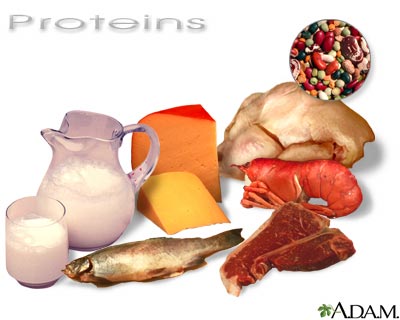
Proteins
The building blocks of proteins are amino acids which are composed mainly of carbon, hydrogen, oxygen and nitrogen (along with some minerals such as iron and sulphur). Various types of proteins are found in different foods, for example, casein is found in milk, albumin is found in eggs, myosin is found in meat and gluten is found in wheat. Although it is essential to maintain a diet which contains these types of foods, some people can be allergic to certain proteins thus prompting the introduction of gluten-free products and increasing the popularity of soy-based products for example.
A lack of amino acids in the diet can decrease the protein levels in the body, hence eating protein rich foods and taking supplements can aid in overcoming the deficiency. This is important because proteins are not only an energy source, but they are also used by the body to produce new critical proteins such as hormones, enzymes and haemoglobin (carrier of iron and oxygen in your blood).
Additionally, proteins are needed to replace cells in bones, skin and hair, and are fundamental in forming new tissues during growth, lactation, pregnancy and recovery after major trauma.
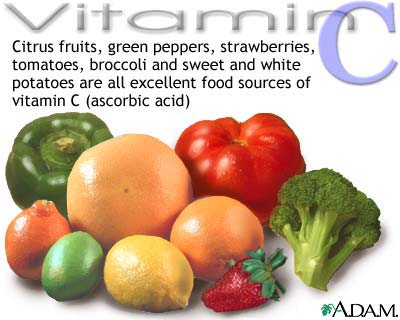
Vitamins
The most important function vitamins serve is to act as facilitators of chemical reactions, as they are often needed by enzymes to carry out their specialized functions. Vitamins can either be classified as fat-soluble (vitamins A, D, E and K) or water-soluble (vitamins B and C). Fat soluble vitamins are harmful in large doses as they cannot be excreted quickly by the body (the body tends to store them in adipose tissue). Water soluble vitamins are easily excreted in the urine, hence large doses are considered safe to take.

Phytonutrients
Phytonutients is a term used to describe powerful antioxidants found in brightly coloured plants and vegetables. Grapes is a great example of these: the burgundy red colour of red grapes contains phytonutrients and research has shown they might be beneficial in chronic (longterm) conditions such as cancer, heart disease, arthritis & immune disorders).
TRENDING TOPICS
Why You Absolutely Need to Try Oil Pulling & Reap the Oral Health Benefits
Have you ever tried to swish oil around in your mouth for a minute? No? Well, what if I told you that swishing coconut oil around in your mouth daily for twenty whole minutes can provide you with numerous health benefits? Would you do it? Check out the best organic, extra virgin coconut oil on Amazon and give it a try! It will work. You will have brighter, whiter teeth within a seriously short space of time!
Health Benefits of Juicing & Why You Need to Try It
he whole of the dieting and nutrition world has been buzzing about the health benefits of juicing for a hot minute now, but really what is it and how could it help you live a healthier life? This article covers four health benefits of juicing, how juicing provides a nutrient, vitamin and mineral rich, low calorie punch of energy and why it is a great way to get the nutritional benefits from fruits or vegetables you may not normally eat (like beets or spinach).










